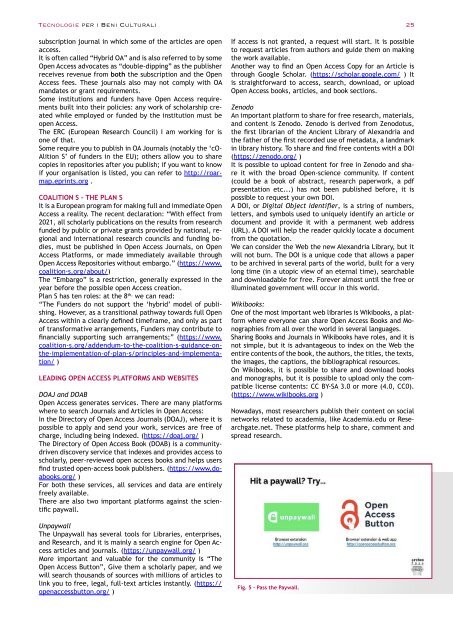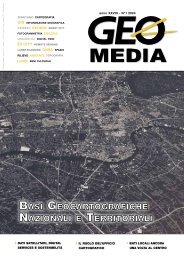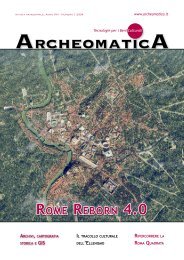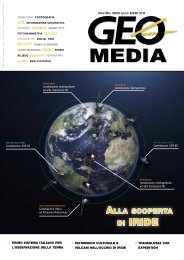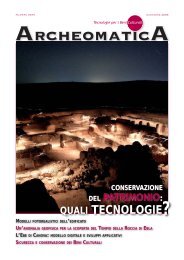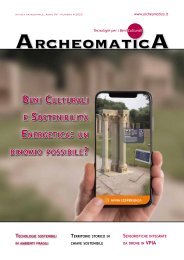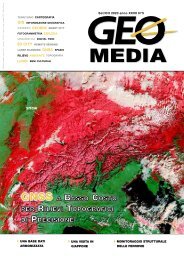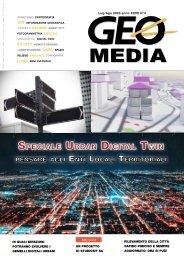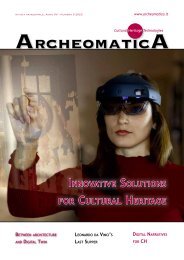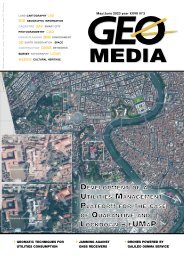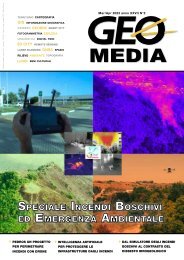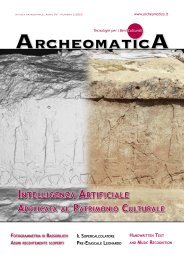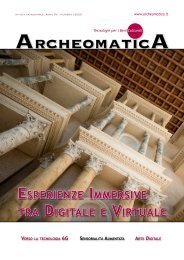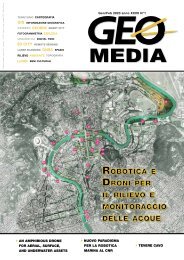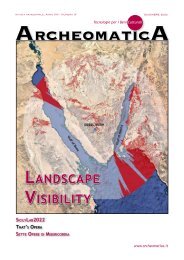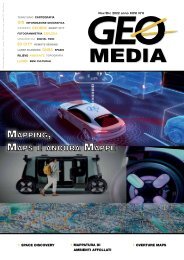Archeomatica 2 2022
Tecnologie per i Beni Culturali
Tecnologie per i Beni Culturali
Create successful ePaper yourself
Turn your PDF publications into a flip-book with our unique Google optimized e-Paper software.
Tecnologie per i Beni Culturali 25<br />
subscription journal in which some of the articles are open<br />
access.<br />
It is often called “Hybrid OA” and is also referred to by some<br />
Open Access advocates as “double-dipping” as the publisher<br />
receives revenue from both the subscription and the Open<br />
Access fees. These journals also may not comply with OA<br />
mandates or grant requirements.<br />
Some institutions and funders have Open Access requirements<br />
built into their policies: any work of scholarship created<br />
while employed or funded by the institution must be<br />
open Access.<br />
The ERC (European Research Council) I am working for is<br />
one of that.<br />
Some require you to publish in OA Journals (notably the ‘cO-<br />
Alition S’ of funders in the EU); others allow you to share<br />
copies in repositories after you publish; if you want to know<br />
if your organisation is listed, you can refer to http://roarmap.eprints.org<br />
.<br />
COALITION S - THE PLAN S<br />
It is a European program for making full and immediate Open<br />
Access a reality. The recent declaration: “With effect from<br />
2021, all scholarly publications on the results from research<br />
funded by public or private grants provided by national, regional<br />
and international research councils and funding bodies,<br />
must be published in Open Access Journals, on Open<br />
Access Platforms, or made immediately available through<br />
Open Access Repositories without embargo.” (https://www.<br />
coalition-s.org/about/)<br />
The “Embargo” is a restriction, generally expressed in the<br />
year before the possible open Access creation.<br />
Plan S has ten roles: at the 8 th, we can read:<br />
“The Funders do not support the ‘hybrid’ model of publishing.<br />
However, as a transitional pathway towards full Open<br />
Access within a clearly defined timeframe, and only as part<br />
of transformative arrangements, Funders may contribute to<br />
financially supporting such arrangements;” (https://www.<br />
coalition-s.org/addendum-to-the-coalition-s-guidance-onthe-implementation-of-plan-s/principles-and-implementation/<br />
)<br />
LEADING OPEN ACCESS PLATFORMS AND WEBSITES<br />
DOAJ and DOAB<br />
Open Access generates services. There are many platforms<br />
where to search Journals and Articles in Open Access:<br />
In the Directory of Open Access Journals (DOAJ), where it is<br />
possible to apply and send your work, services are free of<br />
charge, including being indexed. (https://doaj.org/ )<br />
The Directory of Open Access Book (DOAB) is a communitydriven<br />
discovery service that indexes and provides access to<br />
scholarly, peer-reviewed open access books and helps users<br />
find trusted open-access book publishers. (https://www.doabooks.org/<br />
)<br />
For both these services, all services and data are entirely<br />
freely available.<br />
There are also two important platforms against the scientific<br />
paywall.<br />
Unpaywall<br />
The Unpaywall has several tools for Libraries, enterprises,<br />
and Research, and it is mainly a search engine for Open Access<br />
articles and journals. (https://unpaywall.org/ )<br />
More important and valuable for the community is “The<br />
Open Access Button”, Give them a scholarly paper, and we<br />
will search thousands of sources with millions of articles to<br />
link you to free, legal, full-text articles instantly. (https://<br />
openaccessbutton.org/ )<br />
If access is not granted, a request will start. It is possible<br />
to request articles from authors and guide them on making<br />
the work available.<br />
Another way to find an Open Access Copy for an Article is<br />
through Google Scholar. (https://scholar.google.com/ ) It<br />
is straightforward to access, search, download, or upload<br />
Open Access books, articles, and book sections.<br />
Zenodo<br />
An important platform to share for free research, materials,<br />
and content is Zenodo. Zenodo is derived from Zenodotus,<br />
the first librarian of the Ancient Library of Alexandria and<br />
the father of the first recorded use of metadata, a landmark<br />
in library history. To share and find free contents witH a DOI<br />
(https://zenodo.org/ )<br />
It is possible to upload content for free in Zenodo and share<br />
it with the broad Open-science community. If content<br />
(could be a book of abstract, research paperwork, a pdf<br />
presentation etc...) has not been published before, it is<br />
possible to request your own DOI.<br />
A DOI, or Digital Object Identifier, is a string of numbers,<br />
letters, and symbols used to uniquely identify an article or<br />
document and provide it with a permanent web address<br />
(URL). A DOI will help the reader quickly locate a document<br />
from the quotation.<br />
We can consider the Web the new Alexandria Library, but it<br />
will not burn. The DOI is a unique code that allows a paper<br />
to be archived in several parts of the world, built for a very<br />
long time (in a utopic view of an eternal time), searchable<br />
and downloadable for free. Forever almost until the free or<br />
illuminated government will occur in this world.<br />
Wikibooks:<br />
One of the most important web libraries is Wikibooks, a platform<br />
where everyone can share Open Access Books and Monographies<br />
from all over the world in several languages.<br />
Sharing Books and Journals in Wikibooks have roles, and it is<br />
not simple, but it is advantageous to index on the Web the<br />
entire contents of the book, the authors, the titles, the texts,<br />
the images, the captions, the bibliographical resources.<br />
On Wikibooks, it is possible to share and download books<br />
and monographs, but it is possible to upload only the compatible<br />
license contents: CC BY-SA 3.0 or more (4.0, CC0).<br />
(https://www.wikibooks.org )<br />
Nowadays, most researchers publish their content on social<br />
networks related to academia, like Academia.edu or Researchgate.net.<br />
These platforms help to share, comment and<br />
spread research.<br />
Fig. 5 - Pass the Paywall.


